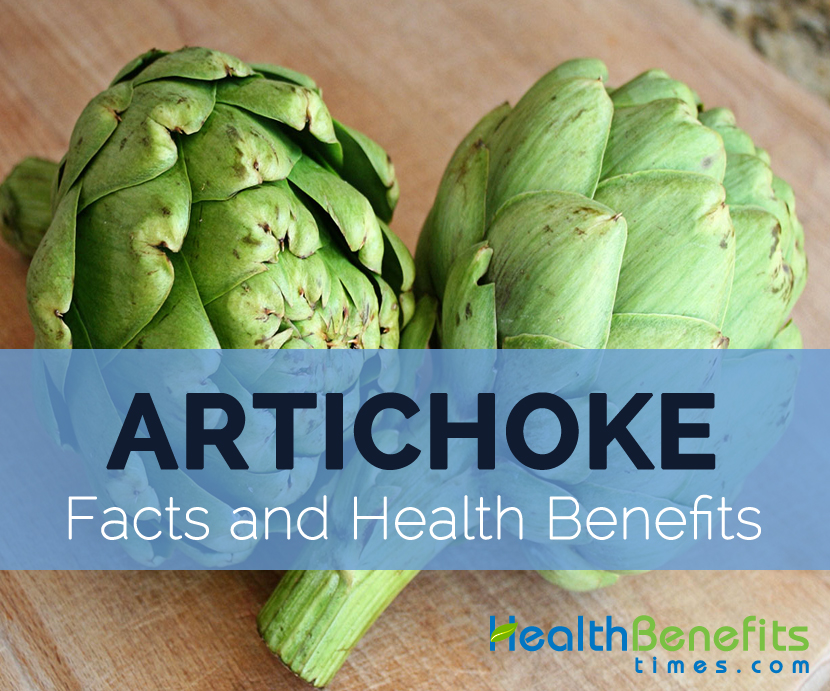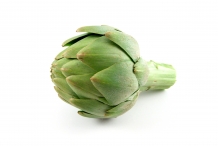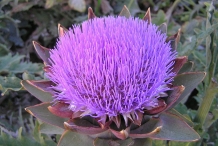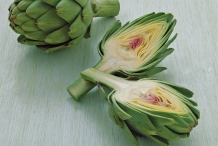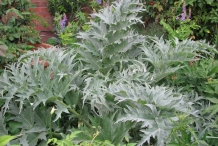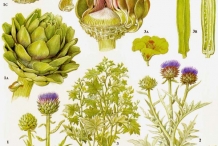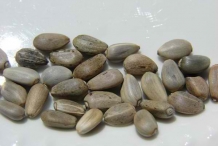Plant
Artichoke is an erect, spiny, biennial or perennial plant growing to 1.4–2 m (4.6–6.6 ft.) tall with ovate – lanceolate, gray green leaves arranged alternately having the length of 30–50 cm and width 10–20 cm. The flower buds with diameter 8–15 cm (3.1–5.9 in) are the edible portion of the plant. The flowers are purple upto seven inches in diameter which flowers from June-July. The stems are 0.6-1.2 m high. It is adapted to warm and dry climates and prefers well-drained soil. The plant lives upto two years.
Fruit
The fruit of Artichoke is obovate, thick with 7.5-8 cm as a diameter. It possess unique nutty flavor and resembles the taste of asparagus. Each fruit weighs about 150 gm. Artichokes are available in Europe and North America during spring, summer and in Middle East during fall.
Edible portions of the plant
The lower fleshy parts are consumed by steaming, boiling, frying, baking, stuffing, pickled, marinated, made artichoke dips or mixed into yoghurt. The young tender leaf stalks are also eaten. After cooking, the bracts are removed and eaten by dipping in mayonnaise, butter, hollandaise, lemon juice, aioli or other sauces. The chards and flowering stems are eaten braised, blanched or fried. The bitter young leaves are consumed by cooking. The dried flowers are substitute for coagulating/ curdling milk.
Health Benefits of Artichoke
Artichokes are rich in antioxidant which assists to detoxify body, improve liver health, aids constipation, indigestion, diarrhea and irritable bowel syndrome. It also lowers the blood pressure, promotes urination and eradicates hangovers. The various health benefits provided by Artichokes are discussed below:
- Prevent cancer
Artichoke is rich in antioxidant such as polyphenols, quercetin and rutin which enhances the immune system to counteract free radicals and natural byproducts which leads to various diseases and health ailments such as heart disease and cancer. Vitamin C in Artichokes also prevents the health conditions such as fibrosis mucositis and breast cancer. The studies have shown that the leaves extract of Artichoke reduces the risk of breast cancer, prostate cancer and leukemia. (1) (2) (3)
- Heart health
Artichoke should be added to the diet because it possesses various cancer fighting properties. The leaves of Artichokes assist to lower the bad cholesterol and increase good cholesterol. Cholesterol blocks the flow of blood, increase blood pressure which leads to the strokes and heart attacks. Artichokes reduce the risk of the heart ailments by lowering the bad cholesterol. (4)
- Maintains blood pressure
Artichoke is rich in mineral such as potassium which is essential for the functioning of various organs. Potassium neutralizes the excess sodium effects which is the cause for blood pressure. It acts as a vasodilator. Artichokes prevent the complications related to blood pressure in diabetic patients. The risk of heart disease and heart attack could be reduced by lowering the blood pressure. (5)
- Prevents liver damage
The antioxidants such as silymarin and cynarin enhance the liver health by eliminating toxins from the liver as well as body. The studies have shown that the antioxidants enhance the repairs damage and regrowth of liver cells. (6)
- Assist in digestion
Artichoke possess high mount of dietary fiber which assists in the functions of digestive system. It keeps the bowel movements regular by adding bulk to the food which reduces the chances of constipation, intestinal cancer, cramps, bloating, discomfort and excess flatulence. Fiber eliminates the LDL cholesterol from arteries which lowers the risk of heart disease. Artichoke eases the inflamed gallbladders. Artichoke enhances the secretion and production of gastric juices, bile, which aids in smooth digestion. (7) (8)
6. Cures hangover
Artichoke reduces the blockage and eliminates toxin from the body which makes it a great cure for hangover. People take some leaves of Artichoke after the heavy drinking.
- Prevent neural tube defects
As Artichoke possess huge amount of folic acid, it prevent the neural tube defects in the new born. Folic acid is important during pregnancy because the process neural tube closure in vitro require some amount of folate to occur. (9)
- Healthy bones
Artichoke is rich in vitamins and minerals such as phosphorus, magnesium and manganese which are essential for increasing the density and health of the bones. It also lowers the risk of osteoporosis. (10)
- Functions of metabolism
Manganese and Magnesium are essential for the process of metabolism which is found in adequate amount in Artichokes. Magnesium is essential for improving the calcium intake, protein synthesis process and strengthens bones. Magnesium impacts the metabolic rates of amino acids, cholesterol and carbohydrates.
- Brain Health
It acts as a vasodilator which transports the oxygen to the brain for elevated cognitive function. Artichoke also possess adequate amount of phosphorus. The reduction of cognitive ability is associated with the deficiency of phosphorus. (11)
How to Eat
Artichokes could be consumed in form of raw or cooked and added to stews, salads, casseroles, soups and sauces. Globe artichokes could be preserved in form of pickle, canned or beverage. It could be grilled, fried, cooked, baked or microwaved as well. It could be taken in the form of herbal tea.
Precautions
An allergic reaction such as intestinal gas and allergic reactions might be experienced by the people who are sensitive to chrysanthemums, ragweed, marigolds and daisies. Artichokes can worsen obstruction of bile duct by increasing flow of bile, which is naturally released by the liver. With the increase in bile flow, gallstones may be worsening.
Nutritional value
Artichokes is rich in vitamins, fiber, minerals but possess lower amount of cholesterol and saturated fat. It is loaded with Vitamin C, riboflavin, thiamin, folate, niacin, Vitamin K and Vitamin B-12, B-6, E, A, D. It also includes minerals such as iron, calcium, sodium, zinc, manganese, potassium, zinc and phosphorus.
Calories 64 Kcal. Calories from Fat 3.69 Kcal.
| Artichoke Quick Facts | |
|---|---|
| Name: | Artichoke |
| Scientific Name: | Cynara cardunculus |
| Origin | The Mediterranean region but now it is cultivated in Italy, France, and Spain. |
| Shapes | Thick, obovate, Diameter: 7.5-8 cm |
| Taste | Similar to asparagus |
| Calories | 64 Kcal./cup |
| Major nutrients | Vitamin B9 (26.75%) Dietary Fiber (17.89%) Copper (16.89%) Vitamin K 17.8 µg (14.83%) Phosphorus (12.57%) |
| Health benefits | Prevent cancer, Heart health, Cures hangover, Healthy bones, Brain Health |
| Proximity | Amount | % DV |
|---|---|---|
| Water | 100.9 g | N/D |
| Energy | 64 Kcal | N/D |
| Energy | 264 kJ | N/D |
| Protein | 3.47 g | 6.94% |
| Total Fat (lipid) | 0.41 g | 1.17% |
| Ash | 0.89 g | N/D |
| Carbohydrate | 14.34 g | 11.03% |
| Total dietary Fiber | 6.8 g | 17.89% |
| Total Sugars | 1.19 g | N/D |
| Sucrose | 0.88 g | N/D |
| Glucose (dextrose) | 0.29 g | N/D |
| Fructose | 0.02 g | N/D |
| Minerals | Amount | % DV |
|---|---|---|
| Copper, Cu | 0.152 mg | 16.89% |
| Phosphorus, P | 88 mg | 12.57% |
| Magnesium, Mg | 50 mg | 11.90% |
| Manganese, Mn | 0.27 mg | 11.74% |
| Iron, Fe | 0.73 mg | 9.13% |
| Potassium, K | 343 mg | 7.30% |
| Sodium, Na | 72 mg | 4.80% |
| Zinc, Zn | 0.48 mg | 4.36% |
| Calcium, Ca | 25 mg | 2.50% |
| Selenium, Se | 0.2 µg | 0.36% |
| Vitamins | Amount | % DV |
|---|---|---|
| Vitamin B9 (Folate, Folic acid) | 107 µg | 26.75% |
| Vitamin K (phylloquinone) | 17.8 µg | 14.83% |
| Vitamin C (Ascorbic acid) | 8.9 mg | 9.89% |
| Vitamin B3 (Niacin) | 1.332 mg | 8.33% |
| Vitamin B2 (Riboflavin) | 0.107 mg | 8.23% |
| Choline | 41.3 mg | 7.51% |
| Vitamin B6 (Pyridoxine) | 0.097 mg | 7.46% |
| Vitamin B5 (Pantothenic acid) | 0.288 mg | 5.76% |
| Vitamin B1 (Thiamin) | 0.06 mg | 5.00% |
| Vitamin E (alpha-tocopherol) | 0.23 mg | 1.53% |
| Vitamin A | 1 µg | 0.14% |
| Beta Carotene | 10 µg | N/D |
| Lutein + zeaxanthin | 557 µg | N/D |
| Betaine | 0.2 mg | N/D |
| Lipids | Amount | % DV |
|---|---|---|
| Fatty acids, total saturated | 0.095 g | 0.15% |
| Lauric acid (dodecanoic acid) 12:00 | 0.005 g | N/D |
| Myristic acid 14:00(Tetradecanoic acid) | 0.005 g | N/D |
| Palmitic acid 16:00 (Hexadecanoic acid) | 0.079 g | N/D |
| Stearic acid 18:00 (Octadecanoic acid) | 0.007 g | N/D |
| Fatty acids, total monounsaturated | ||
| Oleic acid 18:1 (octadecenoic acid) | 0.013 g | N/D |
| Fatty acids, total polyunsaturated | 0.174 g | 1.02% |
| Linoleic acid 18:2 (octadecadienoic acid) | 0.126 g | N/D |
| Linolenic acid 18:3 (Octadecatrienoic acid) | 0.046 g | N/D |


